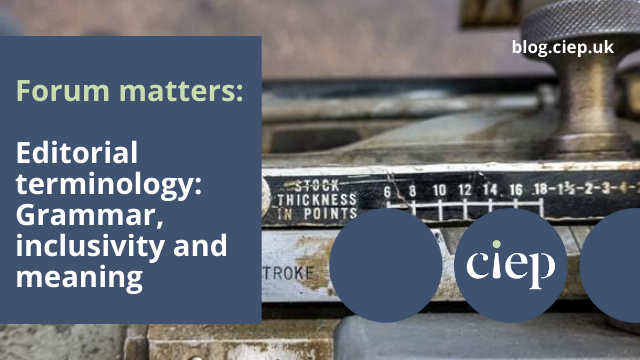In this article one CIEP forum moderator looks at discussions of terminology in the CIEP forums:
- What is terminology?
- Grammar terminology
- Look it up!
- Hold on – what is copyediting?
- Being inclusive
- Niche knowledge
- Just ask!
 What is terminology?
What is terminology?
Terminology. Definitions. Vocabulary. Jargon. The meaning of things. The official definition is ‘the body of terms used with a particular technical application in a subject of study, profession, etc.’ (Lexico). This term can definitely be applied to editing, which has a marvellous lexicon of editing terms, such as widows, orphans, ligatures, en dash, justify, leading and kerning, which new editors may puzzle over.
Grammar terminology
It’s very common to know instinctively that something ‘looks wrong’ when you’re editing, but you may not have the knowledge of grammar terminology to be able to confidently say what is wrong, and why*. Perhaps you weren’t taught formal grammar at school, or perhaps you learned about grammar a long time ago and your skills are rusty. The new CIEP Getting to Grips with Grammar and Punctuation course is designed to give students the skills, terminology and confidence to be a better editor.
This confusion is not helped by the fact that many grammatical terms are known by more than one name: is it a gapping comma or an elided comma? An adverbial or adjectival phrase? A dangling participle or a dangling modifier? And what’s it called when you start a sentence with ‘so’ – and why is it so common today?
And for the last word in terminology? The CIEP proofreading and copyediting courses include access to a Resource centre which contains – among many other useful documents – a glossary of all the publishing and editorial terms you will ever need, from ‘abbreviation’ to ‘Word template’. There’s also a glossary in the back of New Hart’s Rules – my go-to style guide. For fiction editors, MH Abrams’ and Geoffrey Harpham’s A Glossary of Literary Terms will come in useful.
*You’ll need to be registered for the fiction forum to see this post.
Look it up!
One of the skills that it’s essential for an editor or proofreader to master is knowing when to look something up, knowing where to look it up, then actually looking it up and applying the answer to the text they’re working on. The forums can be super useful for this too.
Not sure whether to use ‘who’ or ‘whom’? See ‘who/whom – going cross-eyed’.
Do verb tenses make you tense? Then see ‘Please help with some technical jargon’.
Hold on – what is copyediting?
One of the questions editors and proofreaders are asked most often is: what is copyediting? What is line editing? What’s the difference between them? Unfortunately, there is no one universally accepted definition of these terms. Some people think that they are very different beasts, while some people think they are the same thing. And what about proof-editing? What does that involve – and where do you draw the line?
The most important thing is that editors and proofreaders tell clients clearly what service their project needs, and list the tasks they will carry out on a job. That way, there’s no confusion. For more guidance on this, see What is proofreading? and What is copyediting?
 Being inclusive
Being inclusive
It’s not just editing terminology we need to consider. We also need to think about the words we use around disability, age, ethnicity, culture and sexuality. These are always changing, and editors and proofreaders must keep up with these changes.
Threads on these topics come up a lot on the forums – here’s a selection you may like to read. I guarantee that you will learn something!
A thread on ‘What is a female-headed household?’ led to a passionate discussion on terminology, as did threads on ‘Is “pro-poor” the best term to use?’, ‘Is the phrase “Black, indigenous and people of colour” acceptable?’, ‘People of colour’ and one on the best wording to use around mental health.
I especially enjoyed the thoughtful discussion on these threads on sexist terms and whether or not we should refer to master copies, which referenced a session on sensitivity issues in a recent Cloud Club meeting.
Finally, one thread contains some helpful suggestions for resources around inclusive language.
Whichever words you choose to use, remember this: ‘Your words have power. Speak words that are kind, loving, positive, uplifting, encouraging, and life-giving’ (unknown author).
Niche knowledge
Of course, discussion on the forums isn’t always serious. There are plenty of light-hearted threads too, such as these on betting, butterflies and bridges.
And if you want to tell someone you’re a copyeditor without telling them you’re a copyeditor, is there any better way than to enquire: Should liturgical Latin terms be set in italic?
Just ask!
As ever, the forums are wonderfully diverse resources of all kinds of knowledge. If you want to know the answer to something, and you’ve tried looking in your library of style guides, editing guides and reference books, then ask on the forums. Someone is bound to know.
This feature comes from the band of CIEP members who volunteer as forum moderators. You will only be able to access links to the posts if you’re a forum user and logged in. Find out how to register.
 About the CIEP
About the CIEP
The Chartered Institute of Editing and Proofreading (CIEP) is a non-profit body promoting excellence in English language editing. We set and demonstrate editorial standards, and we are a community, training hub and support network for editorial professionals – the people who work to make text accurate, clear and fit for purpose.
Find out more about:
Photo credits: typesetting tools by Etienne Girardet; Welcome by Belinda Fewings on Unsplash.
Posted by Abi Saffrey, CIEP blog coordinator.
The views expressed here do not necessarily reflect those of the CIEP.




